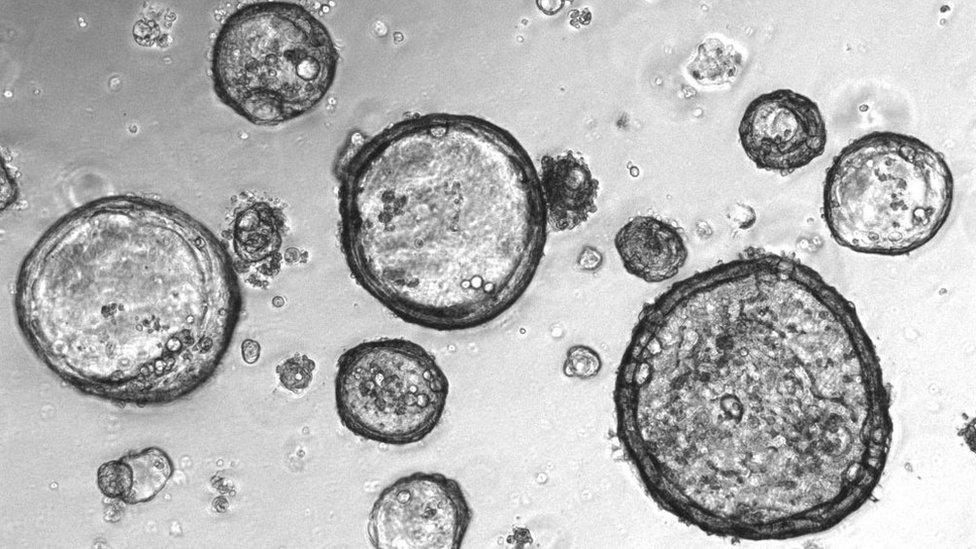'Mini-tumours' created to battle cancer
- Published

The mini-tumours can be used to predict if a patient will respond to therapy
Scientists have been able to predict how cancer patients will respond to therapy by growing miniature versions of their tumours in the laboratory.
They say the groundbreaking work could lead to "smarter, kinder and more effective treatments".
The study, , was 100% accurate at telling which drugs would fail and this could spare patients from unnecessary side-effects.
Mini-tumours could also be a powerful way of testing new drugs.
Tiny brains
Biopsies of 71 patients with advanced colorectal cancer were taken and then grown into miniature 3D cancerous organs in the laboratory.
Growing "organoids" is a relatively new scientific technique and even tiny brains have been made in the lab.
Researchers treated each organoid with the same drug doctors gave to the patient in the clinic.
The results showed:
If the drug worked in the organoids, it worked 88% of the time in the patient
If the drug failed in the organoids, it failed 100% of the time in the patient
Just sparing patients the brutal side-effects of a drug that will not work would make a huge difference, the researchers said.
Dr Nicola Valeri, from the Institute of Cancer Research in London, said: "For the first time we proved these organoids not only resembled the biology of metastatic cancer, but also mirror what we see in the clinic."
In one patient, conventional genetic testing had suggested their tumour would respond to a drug.
But the treatment failed in both the clinic and the organoid. The researchers think organoids might be combined with current tests.
Mouse models
Prof David Cunningham, from the Royal Marsden NHS Foundation Trust, where some of the patients were treated, said: "This promising research moves us forward in the field of personalised medicine, and should ultimately lead to smarter, kinder and more effective treatments for patients."
A organoid of intestinal tissue
Previous attempts to predict how patients would respond to treatment included making "cancer avatars" - essentially mice with the patient's cancer growing in them.
But getting the answers quickly enough to inform treatment has always been the challenge.
Dr Valeri said: "This has been a huge issue in the past, when people were using mouse models it was taking six to eight months to get to the results.
"With this tool we can get results in a couple of months and I think we can get even faster."
You might also be interested in:
But if mini-tumours accurately reflect their "parent" cancer then they could be a powerful new tool for testing drugs and for understanding the biology of why cancers can resist treatment.
They could also be used to decide if patients should take part in clinical trials of new drugs.
Prof Charles Swanton, the chief clinician at Cancer Research UK, said: "Predicting how effective treatments such as chemotherapy will be for an individual patient can be difficult, with very few accurate tests available for doctors.
"This new approach could help us test future targeted therapies before trialling them in the clinic."
Follow James